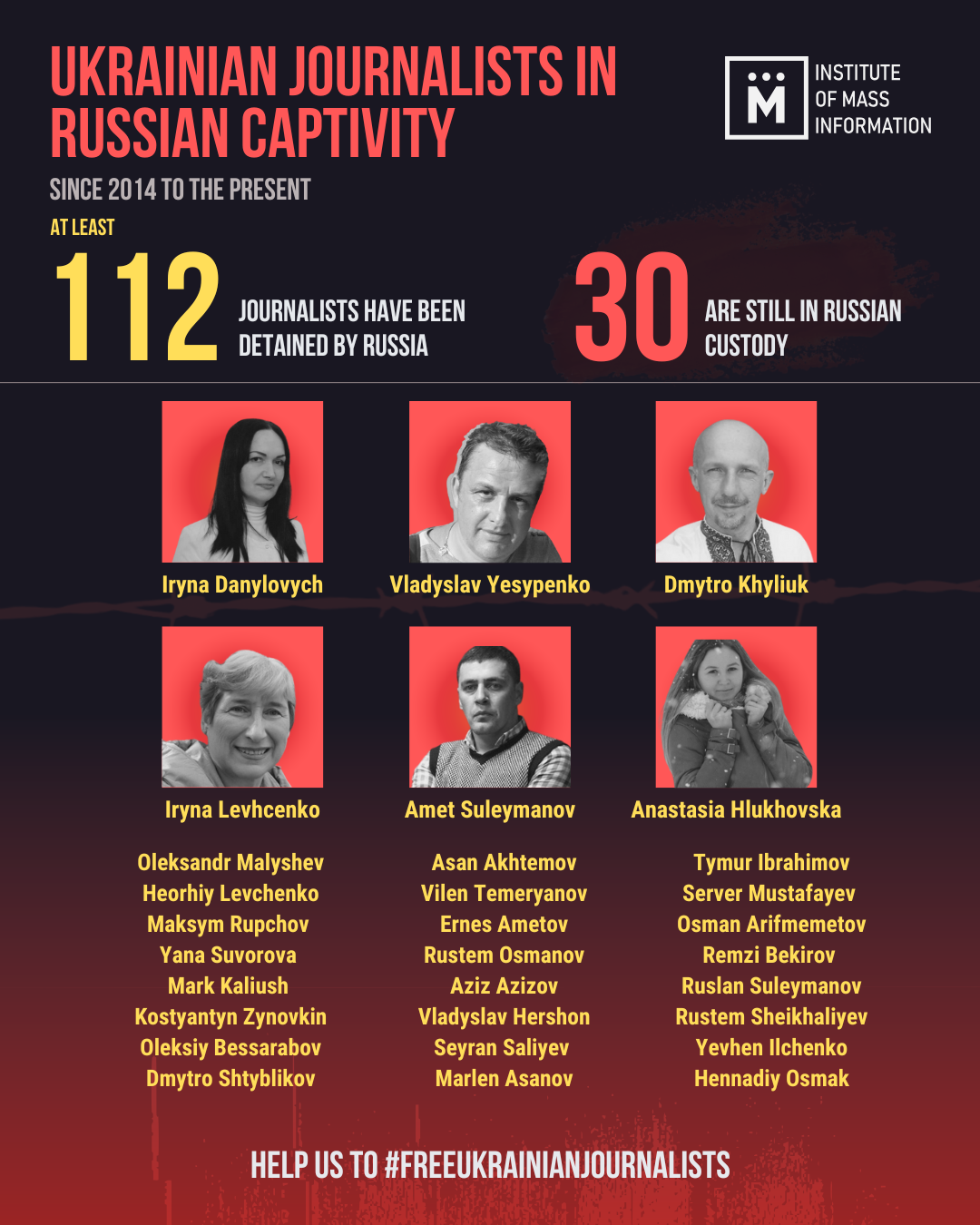At least 112 Ukrainian and foreign journalists have been detained or taken hostage by Russian and pro-Russian forces since the start of the Russo–Ukrainian war in 2014 and up to today.
Such are the data by the Institute of Mass Information (IMI) as presented by Kateryna Dyachuk, the head of the IMI’s freedom of speech monitoring department, at the press conference “Will Russia be punished for its crimes against freedom of speech in Ukraine?” on November 4 in Kyiv.

Ukrainian journalists in Russian captivity. Data by the Institute of Mass Information
The media expert said that multiple media professionals have been captured or became hostages during Russia’s 2014 occupation of Crimea, Luhansk and Donetsk oblasts. The prison terms for the media professionals were different, ranging from one day to six months or two years. The Crimean journalists were given long prison terms on trumped-up charges.
“Since the beginning of Russia’s full-scale invasion, the Russians have kidnapped some media workers in the newly occupied Ukrainian territories; some of them are still in detention. For Victoria Roshchyna, the detention ended in death. Russia has incriminated or is incriminating many media professionals of involvement in terrorist organizations, accusing them of terrorism or spying for Ukraine. The overall trend is that many of them have been subjected to torture, abuse, and beatings. Their equipment was destroyed, their documents were taken,” Kateryna Dyachuk commented.
Russia must be sanctioned for detaining journalists
Unlawful detention of civilian journalists should become grounds for comprehensive sanctions against Russia, stressed the Institute of Mass Information director, Oksana Romaniuk.
“We hope that this impressive data on at least 112 journalists who have been in Russian custody over the past 10 years will make our position stronger. Our position is that there should be collective accountability and sanctions should be imposed on Russia as a state. Moreover, the current sanctions are not enough — they must be stepped up, because Russia’s crimes continue,” Oksana Romaniuk urged.
International organizations must respond more actively to Russia unlawfully detaining media professionals
She noted that a more proactive stance on the part of international organizations such as PACE and the UN is necessary.
“I’m at a loss for words about the UN after Mr. Guterres (UN Secretary-General – Ed.) shook Putin’s hand, but this organization still exists, so we would like it to go back to fulfilling its mandate, remember what mechanisms it has, and put them into practice,” added the IMI director.
She said that cooperation with Ukrainian authorities such as the Prosecutor General’s Office, is also important for the IMI. However, the IMI expects more cooperation with the Coordination Headquarters for POW Treatment.
“We would also like to see a more proactive position on the part of the Coordination Headquarters for POW Treatment and a dialogue with the public. Because the public and the media can increase publicity, promote the release of our prisoners and draw attention to their situation. Torture cannot be happening in silence,” noted the IMI director, Oksana Romaniuk.
The Institute of Mass Information (IMI) is a Ukrainian non-governmental media organization that has been operating since 1996. The IMI defends the rights of journalists, analyzes the media field and covers media-related events, fights propaganda and disinformation and has been providing media outlets with safety gear for trips to the combat zone since the start of the Russo–Ukrainian war in 2014.
The IMI carries out Ukraine’s only freedom of speech monitoring and keeps a list of high quality and sustainable online media outlets, documents Russia’s crimes against the media committed in the course of the war on Ukraine. The IMI has representatives in 20 oblasts of Ukraine and a network of “Mediabaza” hubs to provide journalists with continuous support. The IMI’s partners include Reporters Without Borders and Freedom House; the organization is a member of the International Organization for the Protection of Freedom of Expression (IFEX).
Lesya Lutsiuk, Hanna Chabarai
